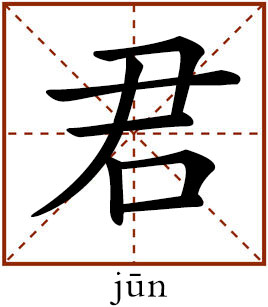jūn

This character refers to a monarch or sovereign of a country. It also can be used as an honorific title. Inspired by the connotations of ethics and nobleness within jun, an ideal personality was created and has been admired for thousands of years in China. This personality archetype is known as junzi.
民贵君轻
mín guì jūn qīng
Min refers to commoner and gui means precious, jun ruler and qing light (in the context of weight). The proverb literally means commoners are precious and the ruler is light. It indicates that people are the most important element in a nation while the sovereign is the least significant.
The proverb originates from the Confucian classic the Mencius. Mencius was an advocate of democratic principles in government. With unusual courage, he declared, “of the first importance, are the people, next comes the god of land and grains, and of the least importance is the ruler.” According to Mencius, the ruler should provide for the welfare of the people in two respects: material conditions for their livelihood and moral and educational guidance for their edification. He also advocated light taxes, free trade, conservation of natural resources, welfare measures for the old and disadvantaged, and more equal sharing of wealth.
君子一言, 驷马难追
jūn zĭ yī yán, sì mă nán zhuī
Junzi refers to a gentleman while yiyan means a word. Si means four and ma horse, nan hard and zhui to chase. The term, taken literally, means a gentleman gives a word and four horses cannot chase it. Usually it is used to describe the trustworthy people who always keep their word. It is similar to the saying, “an honest man’s word is as good as his bond.”
The term originates from the Analects, “when a gentleman has spoken, a team of four horses cannot overtake his words.” It represents the sense of integrity or honesty, one of the most important Confucian virtues. Meanwhile, it suggests that people should be honest and true to their word before they could be called junzi.
(edited by REN GUANHONG)
